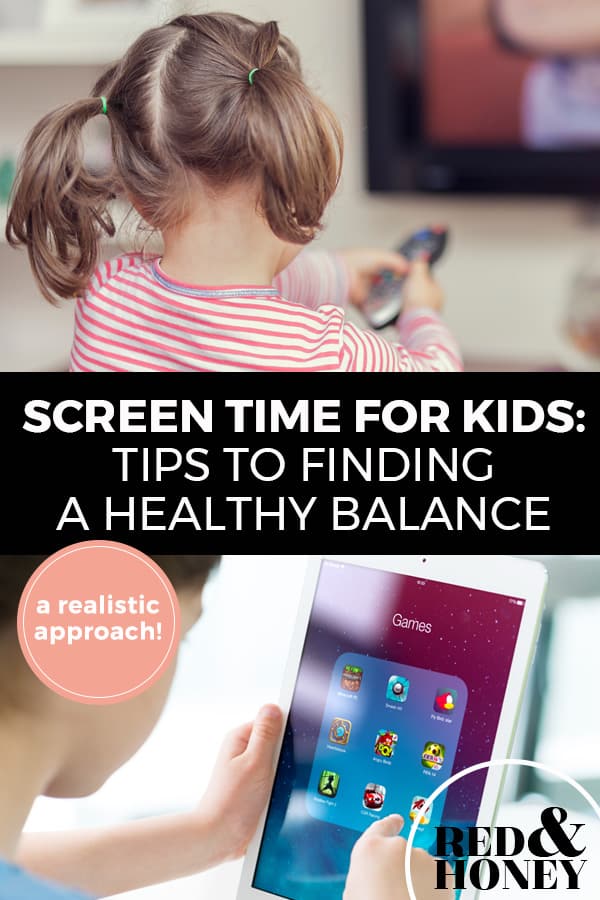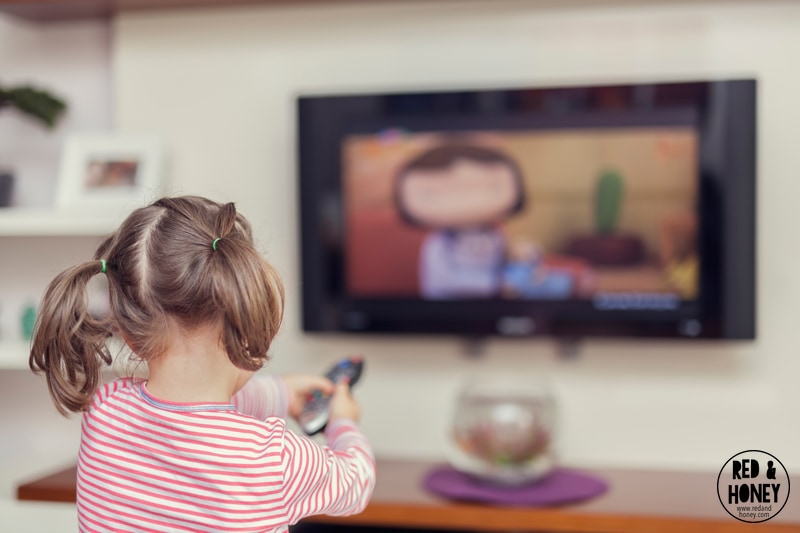
Post by guest, Erin Long, of Home & Grace
I made one of my best parenting decisions long before I became a mother. Sitting in a psychology class in university I learned about how watching TV negatively affects brain development in children under two. Right then and there I decided my children would not watch TV until after their second birthday.
My husband and I don’t watch much TV, mostly sports on the weekend, so after our daughter was born it was easy to keep exposure to a minimum.
But as time passed we added a smartphone, an iPad, another computer and another baby to our lives. However, my resolve never changed. My daughter, now three, watches maybe one movie a week and is around a TV more regularly and plays with a coloring app occasionally.
Keeping my son, 17 months, away from screens is a bit more challenging. Because of big sister there’s simply more opportunities for him to be in front of a screen and he really likes when he can stare at flashing pictures or push buttons on the iPad.
I know as both kids get older it’s going to become harder to establish and maintain boundaries around screen time. So we’re starting now and thinking ahead.
Whether you’ve got little ones like me or older kids who already know how much fun technology is, there are simple and effective ways to create a healthy amount of screen time for kids.
1. Offer other activities
This one’s pretty obvious. Fill your home with fun, age appropriate activities and toys that allow your child to fill her time with play, exploration and learning. Yes, it’s harder to get out arts and crafts than pop in a DVD (and it’s certainly messier) but providing activities gives your child the opportunities she needs to grow and develop.
2. Designate specific times
Whether it’s half and hour before lunch or an hour after school, allotting times as “screen time” allows kids the opportunity to self-regulate and sets clear boundaries.
3. Use your time well
Planning your day and managing your time well will allow you to be proactive and keep kids busy. When you focus on your tasks and diligently work on them you’ll be more able to respond to your kids and put effort, time and energy into doing something other than watching a screen.
Image via Flickr CC
4. Set the example
This is where the rubber meets the road.
As adults we are surrounded by screens and most of the screens we’re trying to keep our kids away from are our own. If we’re constantly in front of a screen, we can’t expect our kids to do any different. However, if we model what a healthy amount of screen time looks like and we actively engage with our families, our kids will recognize what a healthy balance is and will likely adopt similar habits.
5. Use screen time as a reward
For older kids, don’t treat screen time as a right, instead treat it as a reward. Have them earn it through outdoor and active play, completed homework and chores or other good behaviors. You can get great printable screen time tickets here.
6. Keep the TV out of sight
While there are good arguments for keeping TV in the main living area (you know what your kids are watching) it’s best to keep it out of sight, like in a cabinet. If they don’t see it, kids are less likely to go to it by default.
7. Do the hard work of parenting
It can be easy to depend on devices to occupy kids whether in the grocery store or at church. However, easy access to entertainment takes away the opportunity for kids to learn patience, constructive communication and to entertain themselves.

8. Consider a screen sabbath
A screen sabbath is not using any screen for a given amount of time at a regular interval, like one day every week or for a few hours each day. It breaks our dependency on screens for entertainment and forces us to get creative and engage others.
9. Encourage independent play
The primary reason parents reach for technology to keep their kids busy is they want time to get something done. Instead, encourage kids to play by themselves. For little ones it might be nesting bowls and for older kids it could be a craft or playing outside.
Independent play is necessary for children’s development and gives parents a minute or two to get something accomplished.
10. Make screen time interactive
Whether it’s a family movie night or playing a game together on a smartphone, screen time can be used to build meaningful connections with your children.
Ever since I started thinking about this post, “Judge not lest you be judged” has been in the back of my mind. While I believe that overall my family does well with limiting screen time, we’re not perfect.
The day I started writing this we had gone out for dinner and my daughter fell asleep in the car. She was inconsolable from the moment we woke her up to go into the restaurant. After trying for 20 minutes to calm her down I handed her my iPad and she played with an app and finally got control of herself.
The irony did not escape me.
And when my son was in the hospital for two days the only thing that got us through some moments was Sesame Street on YouTube and a gifted app. We do what we can and we don’t hold ourselves guilty when our actions don’t match our ideals.
Screen time is one of the great parenting challenges of our day. The proliferation of devices means we don’t just have to monitor how much time our kids spend in front of the TV at home, it’s also smartphones and other devices that go everywhere with us. We embrace technology and see the positive impact in can have but we also recognize the negative outcomes.
It’s a tightrope walk and it’s all too easy to fall off in the direction of too much.

























llorraine
My son is gonna turn 11 in january. It is very difficult to limit screen time, we learnt how bad it really is for him through him. When he goes on the pc to play games his character changes and he finds it very hard to stop playing. He is not hucked on the tv coz he feels there are too many repeated programs. He has a wii he likes to play, and now wants a ps4 i will not be buying that for him it has on line chatting and he can hear the others talk too its a proper gaming portal, he will be dissapointed this christmas i’m getting him a new bike or table soccer, we did tell him to forget about it, but he is still hoping. I take him out as much as i can but he has a lot of home work. The pc has been banned for 4 months now, we tell him its not a punishment its a way of life, he misses it and we’r bad parents in his eyes. But he will thank us one day (i hope)
iGameMom
Very nice advice and tips. With so many educational content moved into digital format, either online, or on tablet, it is more important to teach kids the balancing skills (among different types of learning activities – free play, out door, sports, reading, games, …) than simply limit the access.
Laura Weymouth
I LOVE number 8. While my daughter doesn’t spend an inordinate amount of time in front of the television, we still do at least two ‘Screen Free’ days per week. This helps her reset and keeps her from becoming dependent on the TV to entertain her. And number 4 is so important!!! I keep my laptop stationary as opposed to moving it around the house so I’ll be less likely to spend time on it, and I refuse to upgrade to a smartphone. That way there’s literally nothing for a kid to do on my phone, but I can still use it for calling, texting and taking photos.
Erin Long of Home & Grace
The pervasiveness of technology is disconcerting and to something I look forward to dealing with when my kids are older! I like the idea of a projector – very cute and would definitely discourage excessive watching of TV.
Christie
As with all of your posts Erin, I’ll be filing this one away to re-read should I become a parent in the future. I love all of the options you’ve provided, especially keeping the TV out of sight. My big dream is to actually not have a television, but to have a projector instead. That way, I can hunt for a vintage roll-down map to double as a screen!
I have to admit that I’m a bit fearful of the pervasiveness of technology, as I would never want my young teen to have a fancy phone, but I also wouldn’t want them to feel excluded.